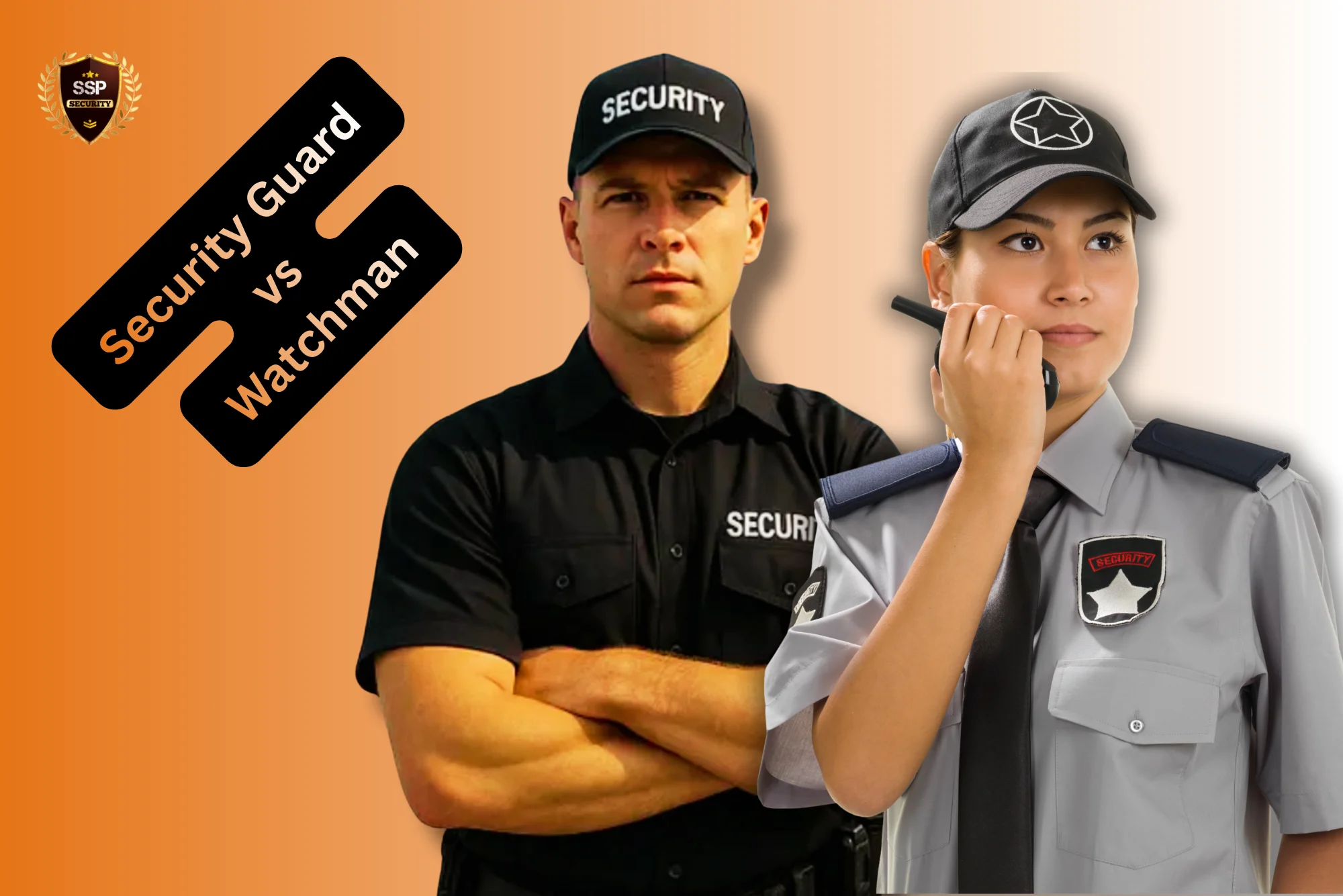Security Guard vs. Watchman What’s the Real Difference?

Have you ever wondered what really separates a security guard from a watchman? At first glance, both seem to serve the same purpose keeping people and property safe. But if you dig a little deeper, you’ll see there’s more to it than that.
Their roles, training, and responsibilities are quite distinct, and understanding these differences can help you choose the right type of security services for your business or home.
To ensure top-tier protection, explore our professional security guard services designed to keep your premises secure and your peace of mind intact.
The Real Role of a Watchman: More Than Just a Night Shift
A watchman is often the silent protector of buildings, construction sites, and residential properties during off-hours. Their job revolves around being observant and proactive as walking the premises checking locks ensuring lights and alarms are functioning, and reporting any suspicious activity.
They might not have the latest gadgets or training certifications, but their reliability and attentiveness make them indispensable. In many neighborhoods, a familiar watchman offers a reassuring sense of safety that technology alone can’t replace.
Watchman vs. Security Guard: The Practical Day-to-Day Differences
The day-to-day difference between these two roles lies in their scope of duty and training level. A watchman’s work is routine and observational often focused on a single property. In contrast a security guard is responsibilities are broader combining technology use report writing and sometimes even emergency first aid.
While a watchman is primarily a physical presence a security guard blends physical vigilance with professional systems management. This distinction becomes crucial when deciding who fits your specific safety needs.
Training and Licensing: Understanding Who Needs What
One of the biggest contrasts between a watchman and a security guard lies in training and licensing. Most countries require guards to complete accredited courses covering surveillance emergency response legal procedures, and communication. They also need to obtain a valid license before being deployed.
Watchmen usually do not go through such formal training programs; their learning comes from experience and familiarity with the premises. This makes guards more suitable for high-risk or public-facing roles, while watchmen fit best in low-risk stable environments.
Tools of the Trade: The Gear and Tech Behind the Uniform
The equipment each role uses also highlights their difference. Security guards often handle surveillance systems radios body cameras and alarm control panels. They might even use digital reporting software to log incidents in real-time.
Watchmen on the other hand depend more on simple tools is flashlights whistles logbooks and sometimes basic communication devices. It is a matter of scale guards operate within a system while watchmen rely on personal vigilance.
Comparing Costs: Which Option Fits Your Budget Better?
When deciding between a guard and a watchman, cost naturally comes into play. Hiring a licensed guard from a professional agency generally costs more due to their training insurance and certifications. Watchmen, being less formal in their structure are more budget-friendly for smaller properties.
However, choosing purely based on price can be risky. High-risk locations large crowds or valuable assets justify the added expense of trained guards. Think of it as an investment in long term security rather than a short-term saving.
Comparison Table: Security Guard vs Watchman
Feature / Aspect | Security Guard | Watchman |
Primary Role | Actively protects people and property by monitoring, patrolling, and responding to threats. | Primarily keeps watch over property during specific hours, often at night. |
Training Level | Requires formal training, licenses, and sometimes certifications. | Minimal or no formal training; relies on experience. |
Duties | Includes surveillance, access control, emergency response, and reporting. | Focuses on observation, reporting suspicious activity, and routine checks. |
Technology Use | Often uses CCTV, radios, and security systems for monitoring. | Usually depends on manual observation and patrolling. |
Work Environment | Found in offices, malls, events, and high-security areas. | Common in residential areas, warehouses, or smaller businesses. |
When Hiring a Watchman Is the Smarter Choice
For small businesses, residential complexes, or warehouses, a watchman can be an excellent choice. Their constant presence discourages intruders, and their familiarity with the area allows them to notice unusual activity instantly. They’re dependable, cost-effective, and can handle routine security checks without complex supervision. In quiet neighborhoods or low-crime zones, having a trustworthy watchman often provides sufficient safety and peace of mind
When You Really Need a Professionally Trained Security Guard
There are scenarios where only a trained security guards can do the job effectively. High-traffic commercial buildings events construction sites and public institutions require individuals with emergency management skills and crowd-control training. Security guards can also enforce access control, manage CCTV systems and de-escalate conflicts. Their professional training makes them essential for properties where a reactive approach and coordination with authorities are necessary.
Professionalism and Communication: Why They Matter More Than You Think
Professionalism is one of the biggest differences between a guard and a watchman. Guards undergo behavioral and communication training to ensure they can interact calmly and confidently in stressful situations.
Whether it’s dealing with a visitor reporting an incident, or assisting staff they act as representatives of the business. A well-mannered guard not only protects your property but also enhances your brand is credibility and customer experience as something that cannot be measured by a paycheck alone.
Legal Powers and Duties: What Every Property Owner Should Know
Security guards often operate under a set of legal rights and responsibilities that grant them certain authority as like detaining trespassers or managing crowd access until police arrive. Watchmen however have limited legal powers. They can report incidents but cannot intervene beyond basic safety measures. Understanding this boundary helps property owners assign appropriate duties and avoid potential legal issues in case of an incident.
How Security Staff Influence Your Business Image and Reputation
Believe it or not, the way your security team behaves can directly impact how customers perceive your business. A polite alert and professional guard adds value to your reputation. On the other hand, an inattentive or untrained staff member can create negative impressions. Businesses that invest in quality security not only ensure protection but also demonstrate care and reliability to client’s partners and employees alike.
The Future of Security Work: Adapting to Modern Demands
Security work is no longer just about physical presence. With the rise of AI smart surveillance systems and mobile technology guards and watchmen are adapting fast. The future will likely see both roles merging where even traditional watchmen use mobile apps or smart devices to report incidents. Continuous learning digital literacy and adaptability will define tomorrow is security professionals bridging the gap between human intuition and smart technology.
How to Decide Which Security Personnel Suits Your Organization
The decision ultimately depends on your security needs risk level and environment. If you manage a residential building warehouse or small office a watchman may be the right fit. But for commercial properties public events or high-value assets professional guards offer the expertise you need. Evaluate your location is vulnerabilities potential threats and required response times before choosing between the two.
Final Thoughts: Choosing the Right Protection for Your Property
Both watchmen and security guards serve essential roles in keeping our spaces safe. The difference lies in their training authority and approach to duty. A watchman provides consistency and familiarity while a security guard brings professionalism and structure.
The best choice depends on your priorities as whether it’s budget formality or what level of security guard you are looking for. What is most important is that your property employees and visitors always feel secure no matter who stands at the gate.



